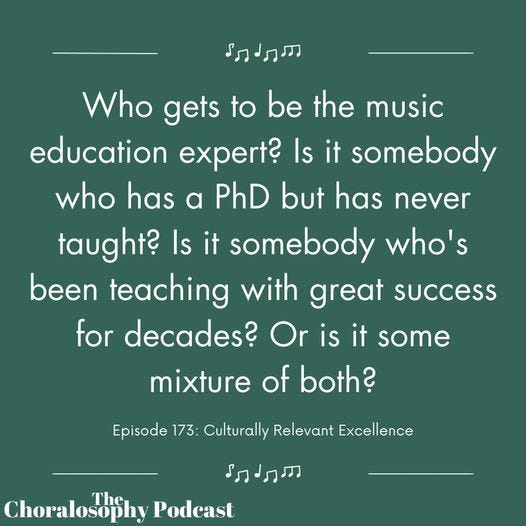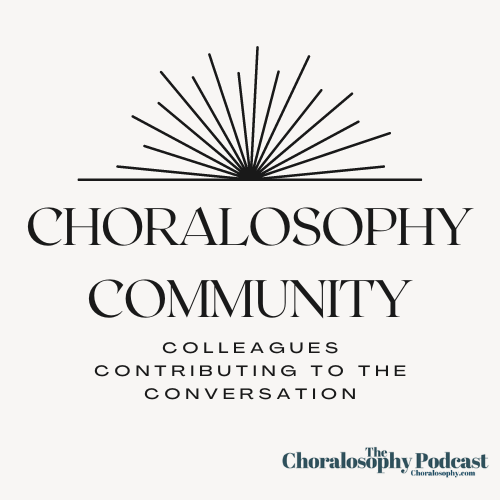The Higher Ed Problems That Shall Not Be Named
"Being able to teach well is treated as a side quest in the Higher Ed world." an Anonymous conversation with a PhD Music Education Professor. NEW: Find more blogs from a growing staff of contributors!


The post above generated a fantastic conversation on Facebook in the “Choralosophers” group. One that included many criticisms and defenses of the ways in which Music Educators, and Educators more broadly are trained. I think it is a conversation that is, and should be, WELL within the bounds of reasonable, professional discourse. Even if it is contentious. It was a respectful conversation, as conversations held by the members of that Facebook group tend to be. Some comments included in this thread were:
As someone with a MM I’ll tell you my degree when a long way in helping me understand music and “theoretically” how I should teach. But my greatest learning moments have been in the classroom at the teacher myself. I think there is massive amounts of value in degrees but none of it matters until you have applied it and seen it’s application in real life.
Soooooo many mus ed profs haven’t taught in a public school classroom. Soooo many classroom teachers are getting higher ed degrees from these folks. Head scratch…
A true expert can find success in a variety of situations. They have wisdom to know how to proceed through challenges. They have been “there”. They have done “that”. It’s not their first rodeo.
An expert also spends more time empowering others than self aggrandizing. They find meaning and reward through the wins of others within their sphere of influence.
An expert knows enough to know that they don’t know everything. They’re the first to say “I’m not sure”. They’re the last to make assumptions. They are never finished learning.
I think it's important to understand that PhD vs. classroom teacher are not a hierarchical structure, it's a symbiotic relationship. Classroom teachers are real work practitioners; researchers try to understand problems and create solutions through a scientific lens. Each should understand their value and strengths and respect the position of the other. Epistime and Techne. Batman and the Joker
As this conversation rolled on, I started to get the sense that there is quite a bit of sensitivity on this issue. Either from classroom teachers who do not feel like their expertise “ranks well,” or from Higher Ed professors understandably defending their place in the ecosystem.
Then, I got a private message from someone who had been reading and wanting badly to comment, but decided a private conversation would be better. For the conversation below, I have called my interlocutor “Prof:”
Prof: I don't know if I want to wade into the comments and get flamed by my higher ed colleagues....
Being able to teach well is treated as a side quest in the higher ed world --which in an area like education seems antithetical-- but that's the reality. It's a different career entirely and I'm still coming to terms with that as one of the outliers who spent a significant number years teaching before moving to higher ed. Very few teachers with experience (or a family) are willing to take the pay cut and go MORE into debt for a terminal degree and move locations to teach college, so way too many college professors have 5 or less years of K-12 teaching experience. I tell a lot of people that my PhD didn't make me a better teacher (because that wasn't the purpose) but it's a piece of paper that says I'm pretty good at looking things up and answering questions. Teaching is what I learned how to do before that.
Prof: The more I get into the higher ed world I find there are two types of people who become professors: The kind who want to make music education stronger, change the profession, move us all forward---and those people tend to be good at their jobs (or at least have redeeming qualities) despite a lack of k-12 experience, and then there's the other type: The ones who couldn't hack it in a classroom or felt they needed something "higher" because they didn't get the high school job they thought they were entitled to.
Me: Yep. You have nailed it on the head. And higher Ed people are very sensitive about this. Because they also know it’s real
Me: Third type: activist. No interest in pedagogy or learning outcomes. Just political outcomes

Prof: Thankfully, that third type, at least from what I’ve observed so far, is rare. And yes, the higher Ed community is incredibly sensitive about that which I understand but you know… Do better
Me: It might be a minority, but it has been growing.
Prof: I really agree with the comment that someone made in the thread, though about a symbiotic relationship because that’s the answer I’m only a few years out of the classroom and I already feel out of touch.
Me: I actually think Universities moving toward ONLY hiring with terminal degree contributes to the perverse incentives
Prof: 100%
Me: My expertise and curriculum vitae would not be welcome. A priori. Regardless of my expertise or ability to teach the course. And it would be DUMB for me to get another degree now. (Financially dumb.)
Prof: Yes, Exactly! The politics and higher Ed are so “effed.” I legit looked at K 12 jobs this year because with that extra degree I would make so much more money than what I’m making right now. It makes me really uncomfortable when people treat me like I’m more of an expert now because I have the piece of paper… Do you know how many adjudication gigs I’ve gotten now that nobody ever called me for before? Like my stats class made me a better at listening and rehearsing? There is some fault in the K-12 side too in assuming or treating those terminal degrees that way.
Me: Absolutely. When hiring for our summer institute, I have to play the game too. I know my local colleagues will only push their kids to attend our camp if they see big name collegiate folks. (Now, of course we try to get truly awesome folks and we do.) But it narrows the pool…
Prof: But the flip side to that is like what I said, at the beginning, it’s a different job with a different purpose. Ideally… In my world, I would hire K 12 teachers to be adjuncts for the methods classes and the conducting classes. And the PhD’s can do the research by going in observing and partner teaching in the classrooms
Me: Correct. Which was common 15 years ago
Prof: You can’t just tell them to go re-search because then will get 10,000 more studies on the best way to shave a clarinet reed or something dumb like that
Me: Another reality is that many higher ed folks LIKE the instant deference and respect that you said makes you uncomfortable
Prof: Oh for sure. Especially that category 2 group that couldn’t get it by..being good at teaching
Me: “Thoughts about me sharing this anonymously?”
Prof: Im ok with you sharing that anonymously. But the higher Ed world is VERY small and anyone knowing it’s me could actually hurt my chances at tenure (they solicit outside recommendations from other professors in the discipline) so reputation is critical. —
Me: How do you feel about “degree inflation?” Aka we just have too many PhD/DMA
Prof: hoo boy. Off the record, it feels like a massive pyramid scheme. Even outside music, universities rely on grad students to teach classes. They're not as cheap as adjuncts, but it's certainly cheaper than hiring full time professors. Like, certain classes are ALWAYS taught by GAs, and that creates an incentive to let people into the graduate programs who might not be successful getting an academic position later.
Me: Right. So partly encouraged BY the universities as cheap labor
Prof: I feel like removing the GA aspect fixes a lot of that---the PhD students can just be...students, but then it's expected that you've been an "instructor of record" when you apply for jobs so just being a student isn't sufficient either. You're right it's all about the financials---not about what's good for the students. If something ends up being good for the students that always just seems like a side benefit
Me: What is your sense about WHY colleagues would be afraid to criticize this system publicly? (You aren’t alone)
Prof: Oh I know I'm not alone. Some of it I think is survivor bias. "I made it so the system isn't fine but I'll change it when I get there,” and then you find yourself sucked into it
Me: Right. And too much money invested to get out
Prof: yeah. I'm one of the lucky ones that way. I didn’t need loans, but I know that is not typical. (Also, that group 2 mentality I think is going away.) There's a balance between teaching the undergrads what we want to see in the profession and what actually exists right now. And some professors are better at balancing the reality with the idealism---usually the ones who spent more time in a real classroom or make an effort to stay connected
Prof: One of the best researchers out there---with a decent amount of impact in the field (especially in terms of policy) is REDACTED who taught I think 8 or 10 years----but more importantly he's married to another teacher so his sense of what's going on outside academia is always grounded in reality
Me: That’s great! So, your overall position is optimistic? Structural problems but getting better?

Prof: Yes. And the structural problems are unique to every university and every state, but almost always it comes back to money---as with many other problems in this country.
Me: Right. I don't know if I agree all of it is getting better. I believe you when you say that more balance is being found between theoretical and practical, but I am not sure the other issue, related to Higher Ed pumping the breaks on incentivizing more and more degrees flooding the market etc is getting better. I think that is getting worse, and will until many schools go under. (Already happening in some places.)
Prof: I don’t disagree with the part about degrees flooding the market getting worse. But, I am definitely witnessing a shift in priorities---the younger generation of professors and undergraduates are not tolerating poor teaching (because we all had that experience ourselves at some point, and there’s more personal money involved.) so I would say the effect on undergrad/new teachers is going to be a net positive.
Prof: The biggest thing holding us back from preparing undergrads properly is not the experience of the professorate but the (again money related) credit caps and curriculum conflicts at the university level or, I'm sad to say it, sometimes the quality of the students who are willing to become teachers
The undergrads coming in right now are kids who were born in an era where all they know is testing and data collection and crisis.
Of course we've discussed that before, there's lots of systemic things that individual faculty can't control.
But why I'm optimistic is that all of that is a symptom of much bigger problems that I believe are coming to a resolution, one way or another.
Me: I agree on that as well. Even if part of that resolution is schools going under, and that may reduce the degree inflation…





